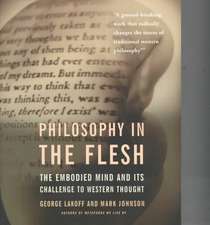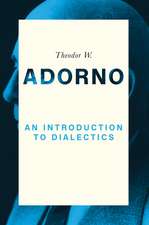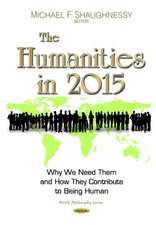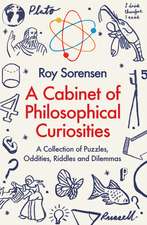Feminist Theory After Deleuze: Deleuze and Guattari Encounters
Autor Hannah Starken Limba Engleză Paperback – 16 noi 2016
| Toate formatele și edițiile | Preț | Express |
|---|---|---|
| Paperback (1) | 175.53 lei 6-8 săpt. | |
| Bloomsbury Publishing – 16 noi 2016 | 175.53 lei 6-8 săpt. | |
| Hardback (1) | 565.55 lei 6-8 săpt. | |
| Bloomsbury Publishing – 16 noi 2016 | 565.55 lei 6-8 săpt. |
Preț: 175.53 lei
Preț vechi: 205.33 lei
-15% Nou
Puncte Express: 263
Preț estimativ în valută:
33.59€ • 35.07$ • 27.80£
33.59€ • 35.07$ • 27.80£
Carte tipărită la comandă
Livrare economică 04-18 aprilie
Preluare comenzi: 021 569.72.76
Specificații
ISBN-13: 9781472529220
ISBN-10: 1472529227
Pagini: 152
Dimensiuni: 138 x 216 x 9 mm
Greutate: 0.18 kg
Editura: Bloomsbury Publishing
Colecția Bloomsbury Academic
Seria Deleuze and Guattari Encounters
Locul publicării:London, United Kingdom
ISBN-10: 1472529227
Pagini: 152
Dimensiuni: 138 x 216 x 9 mm
Greutate: 0.18 kg
Editura: Bloomsbury Publishing
Colecția Bloomsbury Academic
Seria Deleuze and Guattari Encounters
Locul publicării:London, United Kingdom
Caracteristici
A systematic approach to the topic, written with both Deleuze scholars interested in feminist theory and scholars of feminism interested in Deleuze in mind
Notă biografică
Hannah Stark is a Lecturer in English at the University of Tasmania, Australia.
Cuprins
AcknowledgementsList of AbbreviationsIntroductionChapter 1: Thought· Enlightenment Legacies· Feminism and Liberal Humanism· Liberating Thought Chapter 2: Becoming · Becoming-Woman· The Girl· Feminism and the FutureChapter 3: Desire · Desire, Psychoanalysis and Experimental Psychiatry· The Desiring-Machines· EroticismChapter 4: Bodies · Sex and Gender· Sexual Difference· What Can Bodies Do?Chapter 5: · Pure Difference· Identity and Political Representation· Intersectional DifferenceChapter 6: Politics · Recognition and Politics· Feminism Beyond Recognition· A Feminism of ImperceptibilityNotesBibliographyIndex
Recenzii
For students and newcomers to Deleuze, the book's structure and writing style provide a comprehensible primer on concepts that readers will hopefully encounter in a more in-depth manner during their later course of study. What I also appreciated and even enjoyed about the book were the moments when Stark was able to focus on one of Deleuze's texts or concepts and provide a clear and thoughtful explanation of it. Stark knows Deleuze, and this is where her thinking and writing shines so brightly.
Hannah Stark's meticulous introduction to key concepts in Deleuze's philosophy explains their relevance for feminist theory and their creative potential for future feminisms, providing a rare combination of analytical clarity, critical authority and theoretical sophistication. Highlighting the novelty of Deleuze's approach to difference and its value for reconceiving political problems and ideas, Feminist Theory after Deleuze is an essential point of reference for academics and students seeking new ways of understanding feminism as a politics of acts rather than identities; an ethics of alliance rather than recognition; and a philosophy of becoming that engenders profound and joyous intersections with alterity.
Hannah Stark's meticulous introduction to key concepts in Deleuze's philosophy explains their relevance for feminist theory and their creative potential for future feminisms, providing a rare combination of analytical clarity, critical authority and theoretical sophistication. Highlighting the novelty of Deleuze's approach to difference and its value for reconceiving political problems and ideas, Feminist Theory after Deleuze is an essential point of reference for academics and students seeking new ways of understanding feminism as a politics of acts rather than identities; an ethics of alliance rather than recognition; and a philosophy of becoming that engenders profound and joyous intersections with alterity.



























